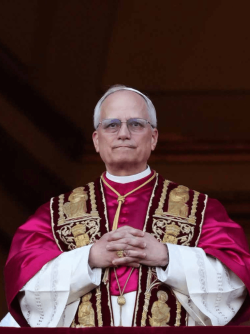Europe’s Time Has Come
Even as you read this, another revival of the Roman Empire is underway. Here’s why we’re not surprised.
The Bible is once again proving its skeptics wrong. Who foresaw the dramatic shift in German thinking that began suddenly three-and-a-half years ago—a shift that continues to intensify? The answer is, those who understand Bible prophecies—prophecies that have been highlighted here at Tomorrow’s World for many years. We did not foresee this change by having greater intellect, looking into a crystal ball, following Nostradamus, or receiving a vision in the night. It is all there in the Scriptures.
We have for decades shown from the book of Revelation, the book of Daniel, and elsewhere in Scripture that Germany will once again become a dominant military force in Europe—and that events will cause ten nations or kingdoms in Europe to give their power over to a German-led colossus that Scripture calls “the beast.” Naysayers have ridiculed the idea of another European revival of the Roman Empire, but that is what is beginning to happen even as you read this article. It is never a good idea to bet against God and His word!
Zeitenwende: Germany’s Turning Point Towards Rearmament
On February 21, 2022, Russian President Vladimir Putin sent troops into Ukraine as “peacekeepers,” then launched a full-scale invasion three days later. That was a wake-up call for European leaders, and Germany’s then-Chancellor Olaf Scholz immediately called for a Zeitenwende—an epochal shift in people’s thinking. There was a sudden move from pacifism to war-readiness as Germans quickly saw the need to build a strong military force for use where needed. Mr. Scholz called for spending €100 billion (U.S. $108 billion) to rebuild his nation’s armed forces and to boost annual military spending to more than 2 percent of GDP—including the purchase of F-35 stealth aircraft capable of carrying nuclear weapons.
This was a startling change, as Germany had run from its militaristic past since the end of World War II, focusing on peaceful coexistence and a strong economy. Other European countries receiving Mr. Putin’s wake-up call have also ramped up their own military spending, but Germany is in a unique position as a result of both its history and its economic power, and the election of United States President Donald Trump has further prompted Europeans to look to themselves for defense. At the Munich Security Conference, U.S. Vice President J.D. Vance on February 14 shocked participants when he criticized America’s European allies for allowing mass migration, eroding free speech, ignoring religious freedom, and overturning elections in the name of “defending democracy.” Stunned European leaders said Mr. Vance’s comments “confirmed their worst fears” (“The Speech That Stunned Europe,” February 18, ForeignPolicy.com).
Germany’s New Direction
The U.S. is not the only country with a new leader. On May 6, conservative Friedrich Merz, leader of Germany’s right-of-center Christian Democratic Union, became his country’s new chancellor. In an interview with public broadcaster ZDF, Mr. Merz promptly called on the Trump administration to “stay out” of German politics and emphasized the role of the European Union: “Together, we are even bigger than the U.S…. We are united, to a large extent anyway” (“Merz to Trump team: Stay out of German politics,” Politico.eu, May 7, 2025).
Observers expect Mr. Merz to accelerate European moves toward self-sufficiency, creating what the European Council on Foreign Relations characterizes as a “two-speed Europe” with an inner core of economically and militarily powerful nations taking a greater role. This fits with Bible prophecy, because right now the European Union is composed of 27 nations. It is primarily an economic union, but the Bible speaks of a military power made up of only ten. We may expect that there will be a broad-based economic union with a smaller inner-core military union that lasts but a short time (Revelation 17:12).
A recent article on German-Foreign-Policy.com featured a sobering title: “All or nothing: German foreign policy advisors and experts urge massive rearmament and much higher troop numbers. They warn: Germany will otherwise lose influence and the EU will disintegrate.” The article went on to say that “in Berlin, government advisors and foreign policy experts are calling for a massive increase in the military budget, drastic cuts in social spending and the vigorous indoctrination (‘change of mentality’) of the population. Rapid militarisation is, they argue, the task of the next German government.… the next government must prepare society ‘for Germany to become the leading European power, diplomatically and militarily’” (March 4, 2025).
Chancellor Merz, a previously strong advocate of the Trans-Atlantic alliance, recognizes the seriousness of the rift in relations and sees that there is no turning back, telling German lawmakers in February, “My absolute priority will be to strengthen Europe as quickly as possible so that, step by step, we can really achieve independence from the USA” (Politico.eu, February 24, 2025). Note that Mr. Merz said this even before the February 28 White House blowup between Vladimir Zelensky and the U.S. President and Vice President. What does this independence entail?
German lawmakers have voted to allow a huge increase in defence and infrastructure spending—a seismic shift for the country that could reshape European defence. A two-thirds majority of Bundestag parliamentarians, required for the change, approved the vote on Tuesday. The law will exempt spending on defence and security from Germany’s strict debt rules, and create a €500bn ($547bn; £420bn) infrastructure fund. This vote is a historic move for traditionally debt-shy Germany, and could be hugely significant for Europe, as Russia’s full-scale invasion of Ukraine grinds on, and after US President Donald Trump signalled an uncertain commitment to Nato and Europe’s defence (“Germany votes for historic boost to defence spending,” BBC.com, March 18, 2025).
Mr. Merz has long been a staunch proponent of fiscal responsibility, so we should not underestimate the importance of his support for this dramatic change. And even as he seeks to bolster the strength of the German military, he has not lost sight of Europe’s need for economic strength. After the Trump administration proclaimed a new slate of “Liberation Day” tariffs announced on April 2, most attention may have focused on U.S.-China relations, but Europe also felt the blow of what it considered an unprecedented assault on its economy. Not since the Smoot-Hawley Tariff Act of 1930 had the U.S. threatened such massive tariff increases on its trading partners. Reacting to news of the new tariffs, Mr. Merz told reporters that he had urged Mr. Trump to take tariffs “down to zero” and reminded him that the “closest trading partner for the U.S is not Germany, France or Poland—it’s Europe and the European Union” (“Merz to Trump: Give us ‘zero’ tariffs,” Politico.eu, May 9, 2025).
Political Power Surge
After decades of positioning itself as a peacemaking and collaborative force in European and world affairs, Germany is now poised to take on a more powerful role in economic and military spheres. Standing alongside EU President Ursula von der Leyen at a May 9 press conference, Mr. Merz told reporters, “Germany needs to play a strong role, an active role, in the European Union, and the German government is going to do so” (“Merz says Germany is back with voice on EU stage,” DW.com, May 9, 2025). Gone are the days of a Germany chastened and shamed by its militaristic ambitions that led to two World Wars in the twentieth century.
A New European World Leader
Mr. Merz is not the only new leader to emerge on the European scene in recent months. The election of Pope Leo XIV has the potential to complicate relations between the U.S. and Europe in ways not previously seen. As the first-ever Roman Catholic pope from the U.S., Leo has arguably become the world’s most prominent American—yet he heads a global organization with powerful roots in Europe. Also a citizen of Peru, Leo has ties to the “Global South” as well as Europe—potentially a valuable asset for a Europe seeking a new balance of world power with diminished U.S. influence. For more on the place of the papacy in European and world events, please read Wallace G. Smith’s informative article “On Popes and Prophecy.”
Europe Preparing for War
The North Atlantic Treaty Organization was formed on April 4, 1949, in the wake of World War II. It has been said informally that NATO was formed “to keep Germany down, Russia out, and the United States in.” What we now see is Germany rising, Russia knocking at Europe’s eastern door, and the U.S. disengaging from Europe.
It is not uncommon for allies to have disputes and differences to overcome, but what we are seeing is a historic geopolitical shift that students of European history and Bible prophecy should find chilling. The rise of an economic and military juggernaut involving a combine of European nations is something this ministry has spoken, written, broadcast, and warned about for decades. A year’s worth of Tomorrow’s World magazines would not contain all we have said on this subject that is now beginning to take shape. We offer several booklets directly addressing this matter, including The Beast of Revelation: Myth, Metaphor, or Soon-Coming Reality? If you haven’t already read this powerful booklet, written by the late evangelist and Tomorrow’s World contributor John H. Ogwyn, I urge you to do so. You can read it online or order a free printed copy at TomorrowsWorld.org. You can also order a free printed copy from the Regional Office nearest you, listed on page 4 of this magazine.
German Leadership, European Power
What we now see happening is the rise of a German-led Europe, beginning to build a powerful world-class military force with nuclear weapons totally independent from the U.S.—its former protector. In an article titled, “Will the threat of Trump end Germany’s austerity zeal?” the journal Politico reported:
“In view of the threats to our freedom and peace on our continent,” the mantra “whatever it takes” must now apply to Europe’s defense, Merz told reporters earlier this month as he announced a historic borrowing plan that could unleash €1 trillion in new spending for defense and infrastructure over the next decade.… “The meeting in the White House between Zelenskyy and Donald Trump really showed the whole drama in which we are living today in terms of security policy, and that is why we had to act quickly,” Merz said on public television on Sunday [March 16]. “We now have to take a more independent path from America,” he added. “Europe’s time has come” (March 18, 2025, emphasis added).
Yes, Europe’s time. Not Germany’s alone. Reuters reported this response from the EU Commission President following the White House blowup between the U.S. administration and Ukrainian President Zelensky: “New EU plans to strengthen Europe’s defence industry and increase military capabilities could mobilize close to 800 billion euros ($841.4 billion), EU Commission President Ursula von der Leyen said…. The EU will propose to give member states more fiscal space for defence investments, as well as 150 billion euros in loans for those investments, and will aim to mobilize private capital as well” (“EU defence plans could mobilise 800 billion euros, von der Leyen says,” Reuters.com, March 4, 2025).
Pressure Towards European Unification
European nations are circling the wagons as they realize they must stand on their own in the face of a threat from the East. The military awakening of Europe, and especially Germany, is no small matter. Twice in the last century a militarized Germany plunged the world into wars that took the lives of tens of millions. We know that it is not their intent to bring about World War III, but the descendants of ancient Assyria will once again wield the sword against the nations of Israel:
Woe to Assyria, the rod of My anger and the staff in whose hand is My indignation. I will send him against an ungodly nation, and against the people of My wrath I will give him charge, to seize the spoil, to take the prey, and to tread them down like the mire of the streets. Yet he does not mean so, nor does his heart think so; but it is in his heart to destroy, and cut off not a few nations (Isaiah 10:5–7).
The transformation of Germany and Europe is historic, and it is taking place at breakneck speed. A BBC article titled “Germany decides to leave history in the past and prepare for war” reflected on Germany’s sobering change in defense policy:
Germany’s military, the Bundeswehr, recently got the all-clear for a massive increase in investment after parliament voted to exempt defence spending from strict rules on debt. The country’s top general has told the BBC the cash boost is urgently needed because he believes Russian aggression won’t stop at Ukraine. “We are threatened by Russia. We are threatened by Putin. We have to do whatever is needed to deter that,” Gen Carsten Breuer says. He warns that Nato should be braced for a possible attack in as little as four years…. “And the sooner we are prepared the better” (BBC.com, March 31, 2025, emphasis added).
Europe: Emerging Beast Power?
The fact is that the U.S. and Europe are pulling apart. Europeans recognize their need to unite for their own defense, and Germany sees its need to step to the front. The book of Revelation describes what we will see in the near future. We cannot know the exact timing in advance, but as shown in the quote above, the time it will take Europe to prepare to withstand an attack by a nuclear superpower to its east is short—perhaps just four years or less.
But Bible prophecy explains that this “beast” power will do far more than defend Europe against Russian attack. As happened twice in the last century, this German-led force of “kings” (nations or groups of nations) will bring the whole world to war once again. “The ten horns which you saw are ten kings who have received no kingdom as yet, but they receive authority for one hour as kings with the beast. These are of one mind, and they will give their power and authority to the beast” (Revelation 17:12–13). And what is the timing of this prophecy? At the return of Jesus Christ, “these will make war with the Lamb, and the Lamb will overcome them, for He is Lord of lords and King of kings; and those who are with Him are called, chosen, and faithful” (v. 14).
My father once told me that the Europeans could never get together—conventional wisdom based on his knowledge of the differences between the European peoples. Yet the Bible describes them doing exactly that. These same ten nations found in Revelation are depicted in Daniel as the feet and toes of a giant image that King Nebuchadnezzar saw in a dream. We know they are the same because of the context and how they will be destroyed by the returning Messiah.
Whereas you saw the feet and toes, partly of potter’s clay and partly of iron, the kingdom shall be divided; yet the strength of the iron shall be in it, just as you saw the iron mixed with ceramic clay. And as the [ten] toes of the feet were partly of iron and partly of clay, so the kingdom shall be partly strong and partly fragile. As you saw iron mixed with ceramic clay, they will mingle with the seed of men; but they will not adhere to one another, just as iron does not mix with clay (Daniel 2:41–43).
So, when will this fragile combine of ten nations come apart? At the time of God’s intervention, when Jesus Christ returns to set up a different kingdom: “And in the days of these kings the God of heaven will set up a kingdom which shall never be destroyed; and the kingdom shall not be left to other people; it shall break in pieces and consume all these kingdoms, and it shall stand forever” (v. 44).
Events are unfolding rapidly. Between the time I write this and the time you hold this magazine, how much more will the world change? Be sure to keep reading Tomorrow’s World to understand Bible prophecy as it plays out before your eyes.






